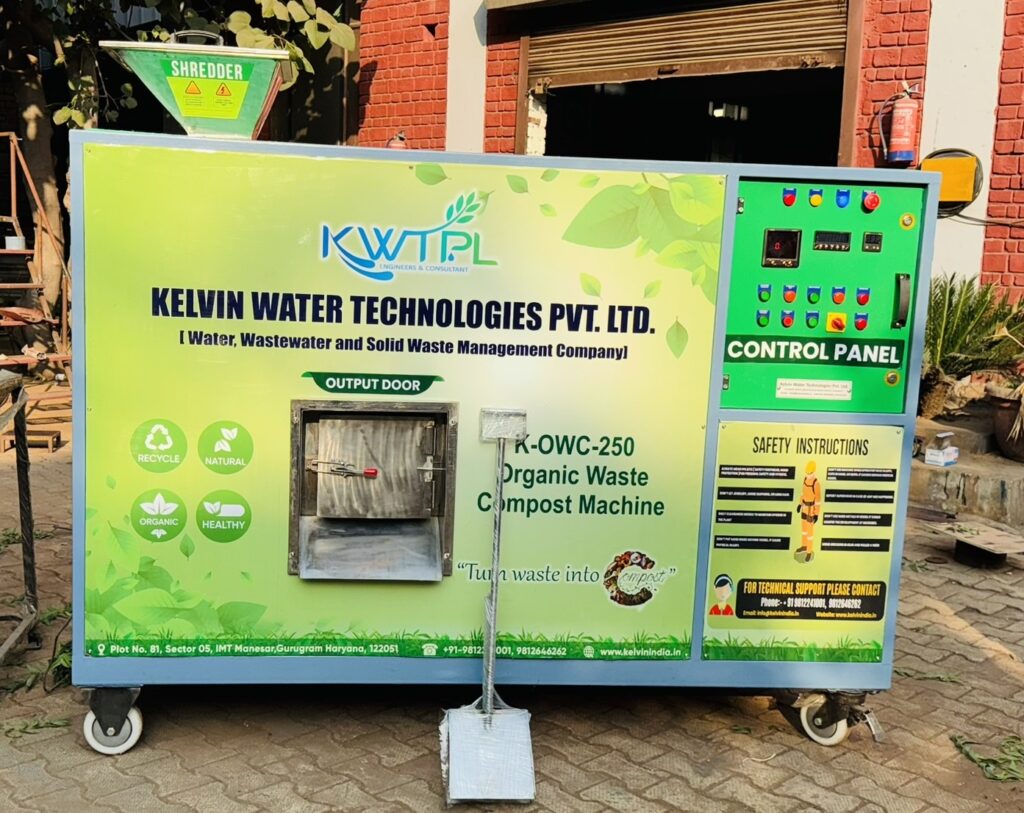
What is an Organic Waste Composter?
An Organic Waste Composter is a machine or system that processes biodegradable waste through natural biological decomposition or controlled mechanical processes, converting it into organic compost. Compost is a nutrient-rich soil conditioner that enhances soil fertility and helps retain moisture.
Organic waste composters can be installed in residential complexes, hotels, restaurants, hospitals, schools, industries, and municipal facilities to manage food waste at the source, ensuring effective waste-to-resource conversion.
How Does an Organic Waste Composter Work?
The working principle of a composter involves the breakdown of organic material by microorganisms (bacteria and fungi) in the presence of oxygen, heat, and moisture. Modern OWCs are designed to accelerate this process through mechanical and automated systems.
Steps in Composting:
- Collection of Waste: Organic waste like fruit peels, vegetable scraps, food leftovers, and garden waste are collected.
- Segregation: Non-biodegradable materials such as plastics, metals, and glass are removed.
- Shredding: Waste is shredded into smaller pieces to increase surface area and enhance microbial action.
- Decomposition: The shredded waste is placed in the composter. With controlled aeration, heat, and moisture, microbes break down the waste into compost.
- Curing and Maturation: The compost is left to stabilize and mature, ensuring it becomes nutrient-rich and safe for use.
- Final Compost Output: After the process, the machine produces high-quality organic compost that can be used as fertilizer.
Types of Organic Waste Composter
- Manual Composters
- Simple bins, pits, or drums used in households.
- Low-cost but requires manual effort and takes more time.
- Semi-Automatic Composters
- Combine manual handling with mechanical processes like shredding and aeration.
- Suitable for housing complexes and small businesses.
- Fully Automatic Composters
- Advanced machines that process waste into compost within 24–48 hours.
- Require minimal human intervention and provide odor-free operation.
- Ideal for large-scale use in hotels, hospitals, industries, and municipalities.
- In-Vessel Composters
- Enclosed systems where temperature, aeration, and moisture are controlled.
- Highly efficient and suitable for areas with space constraints.
Benefits of Organic Waste Composter
- Reduction in Landfill Burden
By diverting biodegradable waste from landfills, composters reduce methane emissions and environmental pollution.
- Nutrient-Rich Compost
The output is natural compost that enhances soil fertility, reduces dependency on chemical fertilizers, and supports sustainable agriculture.
- Cost Savings
Organizations save on waste disposal costs while also generating revenue by selling compost.
- Odor and Pest Control
Modern composters are designed with odor-control systems, reducing hygiene issues associated with waste accumulation.
- Water Conservation
Compost helps soil retain moisture, reducing irrigation requirements.
- Circular Economy Contribution
Converts waste into a resource, promoting recycling and sustainable practices.
- Regulatory Compliance
Many municipalities mandate bulk waste generators like hotels, hospitals, and apartments to process organic waste at source. Composters help in adhering to these rules.
Applications of Organic Waste Composter
- Residential Complexes – To manage household food and garden waste effectively.
- Hotels & Restaurants – To handle bulk food waste generated daily.
- Hospitals & Institutions – For sustainable disposal of canteen and garden waste.
- Municipal Corporations – To manage organic fraction of municipal solid waste.
- Agriculture & Landscaping – Compost generated can be used to improve soil fertility in farms, gardens, and parks.
- Industries – Manufacturing units and food-processing industries can use OWCs to reduce disposal costs.
Future of Organic Waste Composting
The future of waste management strongly relies on decentralized and sustainable solutions like organic waste composters. Some emerging trends include:
- IoT-Enabled Composters: Smart monitoring for temperature, moisture, and compost quality.
- Compact Designs: Portable and space-saving composters for urban households.
- Community Composting Units: Shared facilities in residential areas for collective waste processing.
- Integration with Renewable Energy: Composters that also generate biogas for cooking or electricity.
- Policy Support: Governments promoting composting through subsidies, mandates, and awareness programs.
Environmental Significance of Organic Waste Composter
- Reduces carbon footprint by lowering methane emissions from landfills.
- Enhances soil health and reduces chemical fertilizer usage.
- Promotes sustainable farming and urban gardening.
- Encourages responsible waste disposal and community participation.
Conclusion
An Organic Waste Composter is much more than a machine – it is a sustainable waste management solution that turns food and garden waste into a valuable resource. By reducing landfill dependency, cutting down greenhouse gas emissions, and producing nutrient-rich compost, OWCs play a vital role in promoting environmental sustainability.
Whether installed in homes, institutions, hotels, or industries, organic waste composters contribute significantly to cleaner cities and a healthier planet. With increasing awareness, technological innovations, and government support, the adoption of composters will continue to grow, paving the way for a zero-waste future.



